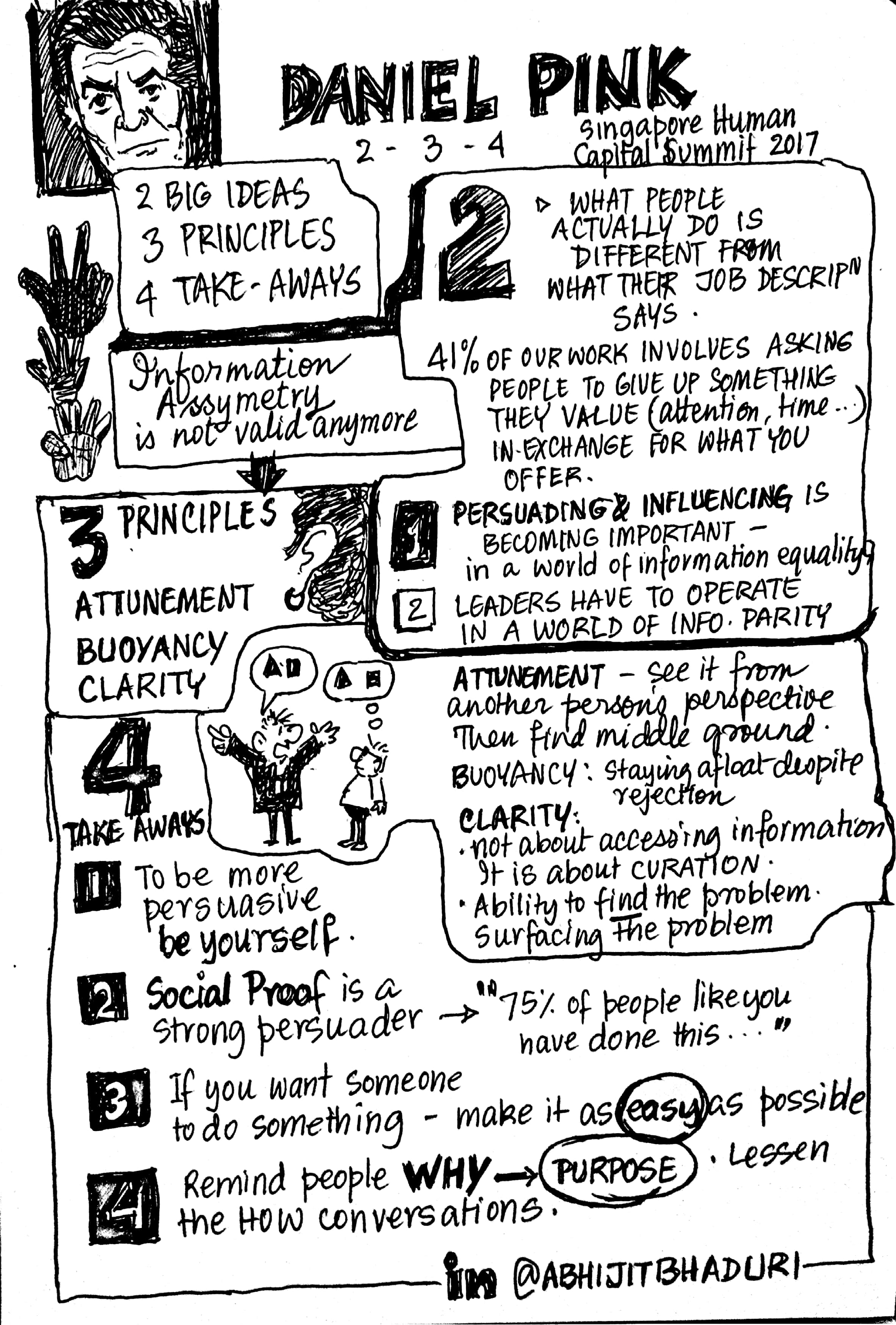Daniel Pink on leadership and the new principles of influence

A research aimed at assessing the gap between the actual job and the job description found that no matter what your role is, out of the 100% of the work, 41% is dedicated to convincing/persuading people to give up something they value. And while this may sound like selling, it is a different type of selling as the denomination of exchange here is not currency but time, commitment, effort etc. So out of every hour, if an individual spends 41% time on persuading, that is a significant about – 24 mins per hour. Many may challenge that our roles is not that of sales and may possibly not like the role as well. As Daniel Pink shares, traditionally, this is because of the information asymmetry where seller used to have more information than the buyer and the reason people don’t like it is because they know how it feels to be on the other side. However, in the last few years, the world has moved to information parity with consumers having all the information they may wish at the click of a button. So, here are the 2 big things:
- Like it or not, we’re persuading, influencing, convincing and cajoling all the time and certainly, this is more for HR leaders
- And we’re operating in a remade landscape – one with information parity
So now, when we know that persuasion is a critical part of our jobs, how do we do it better? In the last 25 years, there has been an exponential splurge in research on psychometrics, human behavior and behavioral sciences. And in evidence there are three qualities that allow you to persuade in this remade world.
A - Attunement: As persuaders we cannot force people to make choices, however to understand the choice behavior, the best is to step out of our own head and get into someone else’s shoes
B –Buoyancy: Every sales individual faces an ocean of rejection every day and hence it is important to stay afloat in that ocean and work towards achieving success
C – Clarity: There are two dimensions to clarity. Earlier the expertise was determined by access to information but today, with no restricted access to information, the role has shifted to curation of information and sifting out the noise. The other aspect if the shift from problem solver to problem finder. Can you as an influencer identify or anticipate latent problems?
To be persuasive is to be human”, Daniel Pink

Daniel Pink continues to share four key research based takeaways on how we can use these qualities and persuade others.
Be yourself: An interesting research tried to correlate the level of extroversion to the performance in sales roles. The researchers collected data of the salesforce from a large American software organization and compared performance and extroversion level. Contrary to the belief, it was not an extrovert who had the best performance, neither the introverts but ambiverts (one who is a mix of introverts and extroverts). Extroverts fail to listen and the introverts fail to ascertain, but the ambiverts bring in the perfect balance to manage the conversations in the right way.
Social – proof is a strong persuader: In an effort to convince hotel guests to reuse the towels, one of the leading hotel tried multiple messages to see what works best. When the key message was “Help save the environment”, the reuse rate was 35%. When the message changed to “Join your fellow guests to save the environment”, the rate went upto 44%. And when the message changed to “Join your fellow guests to save the environment – 75% of the people staying in this room, reuse towels”, the reuse ratio shot upto 49%. Human beings are looking at cues from others to determine how they themselves behave and social proof therefore is a very strong persuader.
Make it easy for them: Another research was conducted on college students to assess the difference in their level participation in a food drive based on different stimuli. Students were categorized into most likely to donate food and least likely to donate food and two types of letters were sent to a mix of these two groups. One was a general letter with no personalization and very basic details and the other one was a personalized letter with very specific details of the day and the next steps as well. Data showed that those who got the detailed letter donated more than those who got the general letter. So, if you want someone to do something, just make it as easy as possible.
Remind people “Why”: Hospitals strive hard to prevent any infection infecting the patients and the doctors and hence always advise the doctors and nurses to wash their hands very regularly. To bring in this shift, a hospital tried different messages – “hand hygiene prevents you from diseases”, “hand hygiene prevents patients from catching diseases” and “ gel in wash out”. Surprisingly, the message on “hand hygiene prevents patients from catching diseases” worked best indicating that what persuaded people is why they are doing their job. As leaders, when they lead, the focus is often on “how” and not the “why” and that needs to shift if they really want to persuade people around.
So while individuals strive to be persuasive, no matter what the job, at the end, quoting Daniel “The ultimate purpose of persuasion is to serve other people.”

















